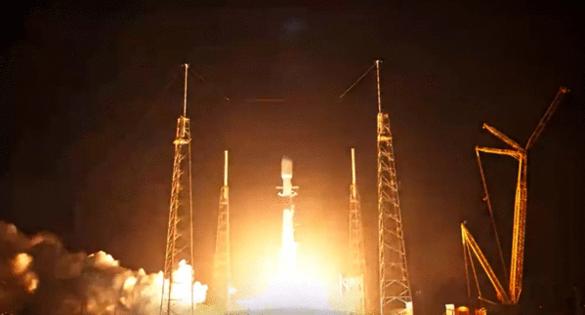
A SpaceX launch from Cape Canaveral lit up the Space Coast for the 50th time this year while also achieving a milestone for the company.
The Falcon 9 rocket carrying up another 22 of the company’s Starlink satellites made a record 17th flight with liftoff at 11:38 p.m. from Cape Canaveral Space Force Station’s Space Launch Complex 40.
The booster previously launched on the GPS III-3, Turksat 5A, Transporter-2, Intelsat G-33/G-34, Transporter-6, and 11 Starlink missions. It made another recovery landing on the droneship A Short Fall of Gravitas in the Atlantic Ocean.
SpaceX has flown all but three of the Space Coast launches this year with United Launch Alliance sending up two and Relativity Space the only other one.
With this mission, SpaceX has flown 37 from Cape Canaveral and another 10 from Kennedy Space Center including all three human spaceflights to orbit from the U.S. this year as well as three powerhouse Falcon Heavy launches.
The launch manifest for the remainder of the year should see the Space Coast beat the record 57 launches it saw in 2022.
That includes several more SpaceX Falcon 9 missions and at least one more Falcon Heavy next month, targeting as early as Oct. 5 to send up NASA’s Psyche probe to the asteroid of the same name.
SpaceX has become the most prolific launch provider since the first Falcon 1 successfully made orbit in 2008. Including this launch, Elon Musk’s company has now managed 265 successful launches across its Falcon 1, 9 and Heavy rockets with the last launch failure coming in 2015. It will also mark it 227th landing and 199th reuse of a rocket booster.
In comparison, ULA has managed 157 launches since it was formed by Boeing and Lockheed Martin in 2006 with its busiest year in 2009 when it had 16 launches. That pace slowed in the last few years with ULA managing only five or six launches from 2019-2021, eight in 2022 and only two so far this year.
After SpaceX and ULA, the next busiest launch provider is Rocket Lab, albeit with smaller rockets. It was on record pace to hit 15 launches in 2023, but suffered an issue during an launch attempt earlier Tuesday from its New Zealand launch facilities resulting in a loss of its customer payload, a satellite for Capella Space.
The Electron rocket completed its first-stage burn and stage separation, but suffered an issue at 2 minutes and 30 seconds into flight.
“Tough day. My deepest apologies to our mission partners Capella Space,” Company CEO Peter Beck posted to social media. “Team is already working on root cause. We’ll find it, fix it and be back on the pad quickly.”
That mission was its ninth launch attempt for the year, which is how many it had in 2022. To date, Rocket Lab has had 37 successful orbital missions across 41 attempts including flights from the U.S. for the first time this year from Virginia.
For now, the next launch is postponed as Rocket Lab works with the Federal Aviation Administration to investigate.
_____







